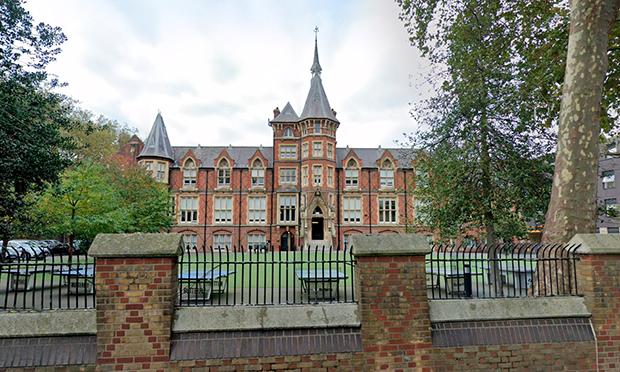Andy Leary-May on Mossbourne: ‘Until 16 months ago, I would’ve been among the parents surprised by the extent of adverse experiences’

Mossbourne Victoria Park Academy. Image: Google
I never expected to find myself writing about Mossbourne.
Until recently, I had no special interest in schools or how they operate. It wasn’t something I thought much about, and I had no particular issue with Mossbourne itself.
Now, however, I find myself connected to high-profile discussions about the school, having been asking for the experiences of a group of parents, teaching staff and former students to be looked into.
In December, the City and Hackney Safeguarding Children Partnership (CHSCP) announced it would conduct a child safeguarding practice review, and emphasized the need for “time and space to engage in its processes sensibly and sensitively and in a manner that creates as little disruption for our children as possible”.
CHSCP also said that “speculation and misinformation will not help… statements have recently emerged that are simply wrong”.
This seems to be continuing and, to the extent that some of it relates to me, I hope that my writing this might be helpful.
Many children, mine included, do well with clear discipline and expectations.
Our nearest school, Mossbourne Victoria Park Academy, is renowned for its strictness. I didn’t, and still don’t, have a problem with this in itself, and my eldest son was mostly happy there for three years.
Until 16 months ago, I would have been among the parents surprised at the extent of the adverse experiences being reported.
Things changed unexpectedly when my son tried to return for his final school year after a long illness.
The medical advice was that he should attend as much as he felt able while reducing his subjects to a manageable number. For reasons we still don’t understand, this was refused.
He was kept from over half of his lessons for 10 weeks; when he finally tried to attend a lesson he was excluded from, he was placed in isolation for two hours as punishment.
We tried hard to work with the school, first by appealing for empathy from the leadership, then through formal complaints. Ultimately, it became clear that we would not be listened to.
We were, however, lucky to be able to arrange home tuition at this late stage, and the episode was relatively short-lived.
Our son worked hard on the subjects he needed for college and is now doing well.
We were glad to move on, but I became aware of other families who had been impacted, often more severely. Many had tried, and failed, to have their concerns addressed by the school.
Seeing common patterns, I reached out to my local councillor who had encountered similar stories from other families.
Together, we urged the Department for Education, Ofsted and the council to speak to the families in order to make their own assessments.
After nearly a year of inaction, we turned to the media as a last resort.
The response was overwhelming: the number of accounts grew from 30 to 300, including 90 ex-students and 30 professionals, spanning two decades across all Mossbourne schools.
These accounts are not mere complaints about strictness.
The first stage of the safeguarding review aims to “clarify and then determine if the concerns can be substantiated”.
It has been reported several times now that the experiences have already been investigated. However, the contact details for the individuals have only now, for the first time, been requested, so this cannot have happened.
In addition to the council launching a statutory review, the Department for Education has reportedly instructed the school to commission its own independent review, led by a King’s Counsel.
CHSCP has noted that “many of the people who have raised concerns acknowledge the strengths of MVPA and highlight the good work done by the vast majority of teachers”.
I am one of those people, and there is much I wouldn’t want to change.
My younger son is one of many children benefiting from excellent teaching and who could do well at the school. He wants to be where most of his friends are.
However, my family is acutely aware that if unforeseen challenges arise, things could go very wrong. Like many things in life, it’s a calculated risk, and we’re fortunate to have options if necessary.
Of the 300 accounts shared with CHSCP, the majority come from individuals who have unsuccessfully sought resolution through the school’s leadership or governing body.
Many stories are sensitive and distressing, with contributors expressing fear of retaliation if their involvement becomes known.
At this stage, very few people know the true nature and extent of these experiences.
This leaves room for speculation, and I hope most people will trust that these actions are being taken in good faith for the benefit of all students.
As Jim Gamble, Independent Safeguarding Children Commissioner for CHCSP, stated: “I doubt anyone who puts children first would suggest that the culmination of concerns could, or should, be ignored.”

So, the school suggested a reintegration plan, and the parent didn't like it. As I understand it they didn't engage with the school's complaints procedure, and they've been trying for over a year to drum up support from wherever, including the local "rent-a-cause" councillor who has no chance whatsoever of being re-elected because they left the Labour Party.
Entitled middle-class wannabee do-gooders who throw their toys out of the pram if they don't get their way, and who are hell-bent on damaging the school out of petty spite.
The truth is that the overwhelming majority of students, parents and local residents think this is all nonsense, and they are happy with the school.
It's not anonymous? It even says that it's by Andy Leary-May in the title as well as the byline.